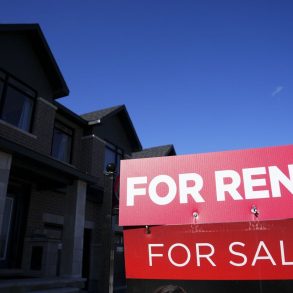Average rent prices have posted their slowest pace of annual growth in a year and a half, but are expected to continue rising, particularly with interest rates once again moving higher.
June data from Rentals.ca’s Rent Report shows the average rent in Canada is up 6.5% from a year ago to $2,014.
Compared to the low of $1,662 reached in April 2021 in the midst of the pandemic, rents are now up by nearly 20%, or over $350 per month, the report added.
In major metro areas of Toronto and Vancouver, average rents are up 15.5% and 9.7%, respectively, compared to last year.

But with the Bank of Canada’s latest interest rate hike, and markets pricing in favourable odds for at least one more, rents are likely to continue to face upward pressure.
“Higher rents are on the horizon with interest rates at a 22-year high, rising home prices and record immigration,” Matt Danison, CEO of Rentals.ca Network, said in a statement. “Gen Z could become the ‘Boomerang Generation’ moving back in with the parents or the ‘Roommate Generation’ splitting rent as it’s unaffordable for many Canadians to pay rent on their own.”
In addition to higher interest rates, which will increase borrowing costs for landlords, the rental market is also expected to pick up in the upcoming typically more active summer months.
“The rental market is expected to heat up further as it enters the seasonal peak for demand during the summer months, driven primarily by an incoming surge in international students and continued deterioration in homeownership affordability as interest rates move higher again,” noted Shaun Hildebrand, president of Toronto real estate research firm Urbanation.
Alberta saw the fastest rent growth of all provinces
Rents increased the most in Alberta, rising 13.4% year-over-year to $1,521. However, rents in Alberta remain approximately 22% lower compared to the national average.
Ontario was close behind with average year-over-year rent growth of 12.4% to $2,409.
The slowest annual rent increases were seen in British Columbia at 5.2%, although it remains the province with the most expensive average rent at $2,468.

At the municipal level, Brampton posted the fastest pace of rent price growth, with an annual rise of 23.4% to an average price of $2,570 for all unit sizes.
North York, ON, was a close second with rents up 22.4%, followed by Burnaby, BC, with an annual increase of 19%.
Here’s a look at the year-over-year rent increases in some of the country’s key markets:
-
- Calgary, AB: +14.6% ($1,944)
- Toronto, ON: +15.5% ($2,808)
- Halifax, NS: +1.1% ($1,894)
- Vancouver, B.C.: +9.7% ($3,137)
- Ottawa, ON: +4.8% ($1,969)
- Winnipeg, MB: +9.1% ($1,487)
- Regina, SK: +6.1% ($1,133)
- Montreal, QC: +10.8% ($1,923)







